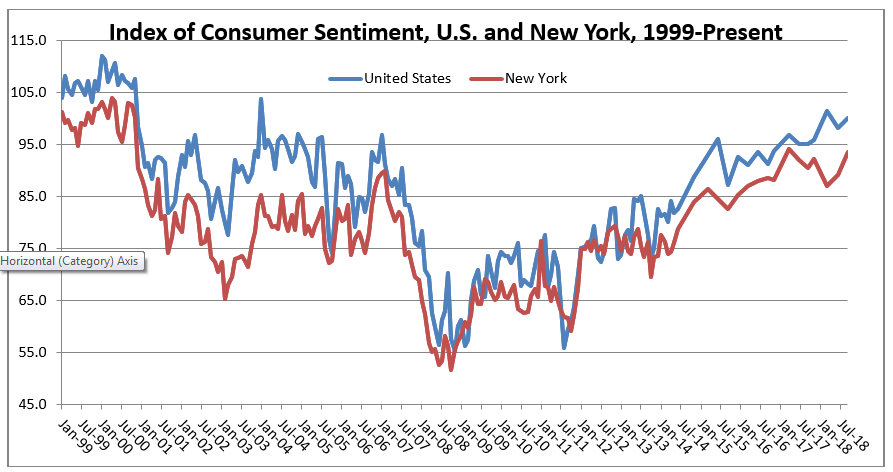-
NYS Consumer Sentiment Up Over 4 Points; Highest Since 3/17; Driven by Increasing Future Optimism
-
New Yorkers Match Nation with Strong Expectations – Personal and Business Conditions
-
Auto Buying Plans Hit 1 in 6; Worries Over Food and Gas Lessen
Press Release Summary Trends Buying Plans Gas and Food
Loudonville, NY – The New York State Index of Consumer Sentiment in the third quarter of 2018 stands at 93.6 up 4.4 points from the last measurement in the second quarter of 2018, according to the latest poll by the Siena College Research Institute (SCRI). New York’s overall Index of Consumer Sentiment is 6.5 points below the nation’s* Index of 100.1. All three indexes for both the nation and New York are well above their breakeven points at which optimism and pessimism balance indicating strength in the consumer driven marketplace.
 *National data compiled by the U. of Michigan * ( ) shows points above/below breakeven point at which sentiment is balanced
*National data compiled by the U. of Michigan * ( ) shows points above/below breakeven point at which sentiment is balanced
“New Yorkers remain bullish about the economy and their personal finances this quarter as the index rose by over 4 points, closed the gap between New York and the traditionally higher national number, and nearly tied the recent high recorded a year and a half ago. Driving the strength of the index is increasing optimism towards future conditions enjoyed by every demographic except low income and older New Yorkers who held steady. Especially up were NYC residents, democrats, young residents and those with high incomes,” according to Dr. Doug Lonnstrom, professor of statistics and finance at Siena College and SCRI Founding Director.
In the third quarter of 2018, buying plans were up since the second quarter of 2018 measurement for cars/trucks to 17.0% (from 14.3%) and consumer electronics to 41.5% (from 40.3%). Buying plans were down for furniture to 26.3% (from 27.7%), homes to 6.9% (from 7.4%), and major home improvements at 19.0% (from 21.6%).
“Concerns over both the bite food and gas take out of the monthly budget fell this quarter. Gas worries were down by 5 points while food fell by 3. Both contribute to the growing optimism and should lead to freer consumer spending. Buying plans for cars and trucks reached 17 percent, the highest since last year at this time, while plans to purchase homes fell slightly but remained strong at nearly 7 percent,” Lonnstrom said.
Thirty-five percent of all New Yorkers say that current gasoline prices are having a very serious or somewhat serious impact on their financial condition. Fifty-two percent of state residents indicate that the amount of money they spend on groceries is having either a very serious or somewhat serious impact on their finances. Twenty-seven percent of state residents say that both gasoline and food prices are having either a somewhat or very serious impact on their finances.

This Siena College Poll was conducted September 8-17, 2018 by telephone calls conducted in English to 802 New York State residents. Respondent sampling was initiated by asking for the youngest male in the household. It has an overall margin of error of +/- 3.8 percentage points including the design effects resulting from weighting when applied to buying plans and/or the perceived impacts of gas and food prices. As consumer sentiment is expressed as an index number developed after statistical calculations to a series of questions, “margin of error” does not apply to those indices. Sampling was conducted via a stratified dual frame probability sample provided by Survey Sampling International of landline and cell phone telephone numbers from within New York State weighted to reflect known population patterns. Data was statistically adjusted by age, region, gender and race/ethnicity to ensure representativeness. The Siena College Research Institute, directed by Donald Levy, Ph.D., conducts political, economic, social and cultural research primarily in NYS. SCRI, an independent, non-partisan research institute, subscribes to the American Association of Public Opinion Research Code of Professional Ethics and Practices. For more information or comments, please call Dr. Doug Lonnstrom at 518-783-2362. Survey cross-tabulations and buying plans can be found at www.siena.edu/scri/cci.





